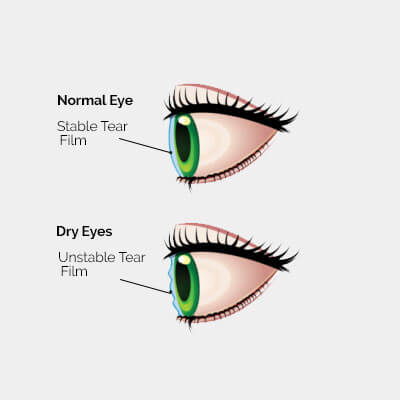Your Partner in Dry Eye Relief
What Is Dry Eye Syndrome? (DES)

Dry eye syndrome occurs when tear production and drainage are not in balance. People with dry eyes either do not produce enough tears or their tears are of poor quality. The result? Unpleasant symptoms, including itching, burning, redness, watery eyes, excessive tearing—and even eye pain. Dry eye syndrome can also increase your risk for more serious eye problems like corneal ulcers.
Without treatment or proper medication, DES can worsen over time.
What Causes Dry Eyes?
While over 80% of dry eye cases are due to blocked oil glands in the eyelids — a condition called meibomian gland dysfunction or evaporative dry eye — other factors can also cause this syndrome. These include:
Gender – the majority of dry eye sufferers are women. This tends to be caused by hormonal changes, whether through the use of contraceptives, pregnancy or menopause.
Age – there’s a higher prevalence of DES in those over 50 years of age
Environment – dry wind, dry air and dry climates can evaporate the tears. Home and car heaters, air conditioners, fans and hair dryers also cause tears to evaporate.
Medication – these include antidepressants, decongestants and blood pressure medications.
Auto-immune disorders – Sjogren’s disease and arthritis, among others.

How Do I Know If I Have Dry Eye Syndrome?
Do any of these symptoms seem familiar?
- Gritty, itchy, or stinging eyes
- Excessive tearing and discharge
- Eyes that feel tired or dry
- Increased light sensitivity
- Regularly using eye drops
- Discomfort that worsens as the day progresses
Suffering from dry eye syndrome not only diminishes your quality of life but also makes daily activities such as reading, doing sports, or driving a struggle.
Think you have dry eye syndrome? Get to the root of your eye discomfort by contacting us today.

What Others Are Saying About Us
Learn More about Dry Eye Syndrome | FAQ
Treatment should be sought early to avoid gland atrophy and other complications. Visit our practice to ensure you have a personal treatment plan designed for you.
Don’t wait for dry eye condition to deteriorate. Take action today by booking an appointment with Triangle Family Eye Care in Morrisville today.

Lasting & Effective Dry Eye Treatment
Our dry eye treatment program is individualized to each patient according to the root cause.
We aim to restore or maintain the normal amount of tears in the eye to minimize dryness and discomfort. Book a consultation with one of our eye doctors, who can prescribe a customized treatment plan to keep your eyes healthy and comfortable all day, every day.


